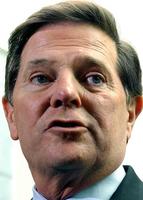DeLay might be cleared of charges
August 25, 2008
Money-laundering charges against former U.S. Rep. Tom DeLay and two indicted co-conspirators may be dismissed because the 2002 campaign finance case involved checks and not cash, a lawyer for DeLay said Sunday night.
Written by Laylan Copelin, The Austin American-Statesman

Tom Delay faces charges related to campaign donations. (Dennis Cook/ASSOCIATED PRESS )
Money-laundering charges against former U.S. Rep. Tom DeLay and two indicted co-conspirators may be dismissed because the 2002 campaign finance case involved checks and not cash, a lawyer for DeLay said Sunday night.
"We win," said Dick DeGuerin, DeLay's lawyer, "because there's nothing but checks in the case."
The state's 3rd Court of Appeals on Friday actually upheld the money-laundering indictments against DeLay's two campaign associates, John Colyandro of Austin and Jim Ellis of Washington.
But the ruling contained a silver lining for the trio's lawyers because it concluded that the state's money-laundering statute — written in 1993 to combat illicit drug activity by focusing on the cash in the criminal transactions — did not apply to checks at the time DeLay is accused of laundering corporate money into campaign donations. The Legislature changed the law in 2005 to include checks.
Lawyers for the three defendants have included the check-versus-cash argument in other legal motions. But it was not part of the constitutional challenge that was before the 3rd Court of Appeals, so the appellate court could not dismiss on those grounds, DeGuerin said.
Instead, the court upheld the money-laundering indictments against DeLay's associates, saying the law is not unconstitutionally vague and gives adequate notice of the conduct that would be considered illegal. Three judges, all Republicans, issued Friday's opinion, which was written by Justice Alan Waldrop.
Travis County District Attorney Ronnie Earle said the check-versus-cash argument is absurd: "The court's reasoning is like saying that you can get away with murder if you pay the hit man with a check."
Prosecutors can file a motion for a rehearing before the appellate court.
DeLay is technically not a part of Friday's opinion because he was indicted a year after Colyandro and Ellis. But the ruling could effect all three.
DeGuerin said he would take the appellate court's opinion back to Pat Priest, the trial judge in San Antonio, who has dismissed the check argument previously. Armed with the opinion, however, DeGuerin said he expects Priest to reconsider DeLay's motion to dismiss the charges because only checks — not cash — were involved in the transactions.
In 2002, as Republicans tried to win control of the Texas Legislature, DeLay and his associates at Texans for a Republican Majority collected corporate donations, which state law generally prohibits from being spent in connection with a campaign.
Colyandro then sent $190,000 in corporate contributions to Ellis, his counterpart in Washington. Ellis gave the corporate donations to an arm of the Republican National Committee, which days later sent $190,000 in campaign contributions to seven Republican candidates for the Texas House of Representatives.
When the exchange was discovered, officials at the Republican National Committee said it was a coincidence and that the campaign donations were not the same corporate money.
DeLay, R-Sugar Land, wanted the Republicans to control the Legislature so the GOP could redraw congressional districts to ensure a Republican majority in Congress and buttress his standing as U.S. House majority leader. A Republican majority, in fact, did just that.
The money-laundering indictment, however, forced DeLay to give up his House leadership seat and, ultimately, retire from Congress in 2006.
Last summer the Texas Court of Criminal Appeals confirmed the dismissal of a separate indictment against DeLay and his associates on a charge of conspiring to violate the state election code. The court ruled that conspiracy did not apply to election code violations until 2003 — a year after the $190,000 exchange — when the Legislature changed the law.
On Sunday night, DeGuerin noted the similar circumstances for the money-laundering indictment.
"If this is how it ends," DeGuerin said, "it means every crime Ronnie Earle indicted Tom DeLay for was not a crime."
![]()
![]()
Related Stories
![]()
Fair Use Notice
This site contains copyrighted material the use of which has not always been specifically authorized by the copyright owner. We are making such material available in our efforts to advance understanding of environmental, political, human rights, economic, democracy, scientific, and social justice issues, etc. We believe this constitutes a "fair use" of any such copyrighted material as provided for in section 107 of the US Copyright Law. In accordance with Title 17 U.S.C. Section 107, the material on this site is distributed without profit to those who have expressed a prior interest in receiving the included information for research and educational purposes. For more information go to: http://www.law.cornell.edu/uscode/17/107.shtml. If you wish to use copyrighted material from this site for purposes of your own that go beyond "fair use", you must obtain permission from the copyright owner.